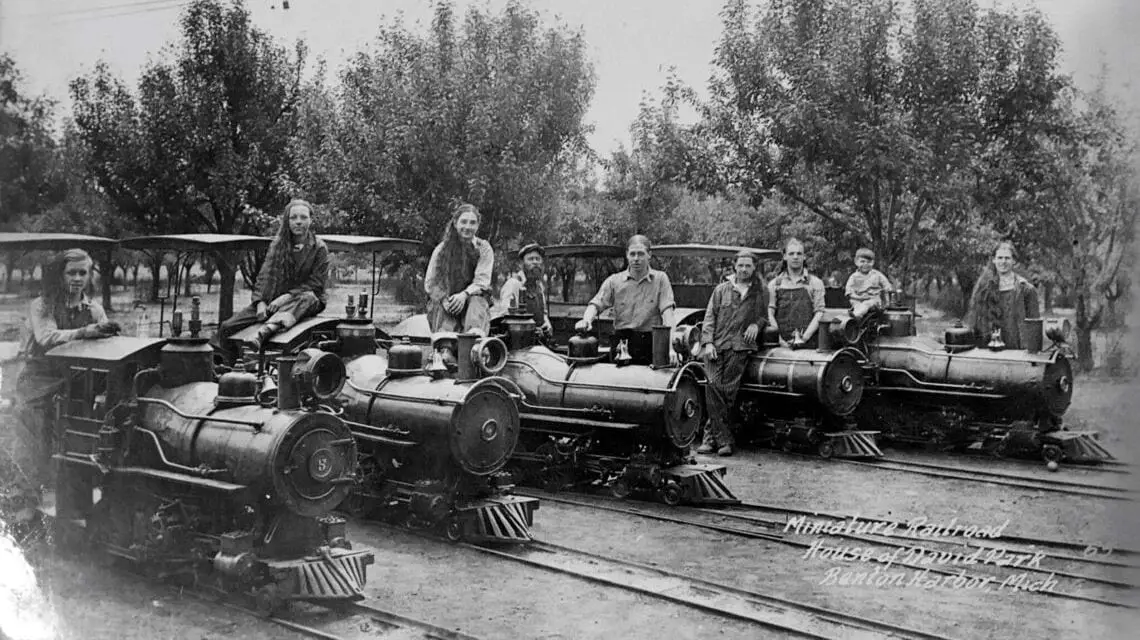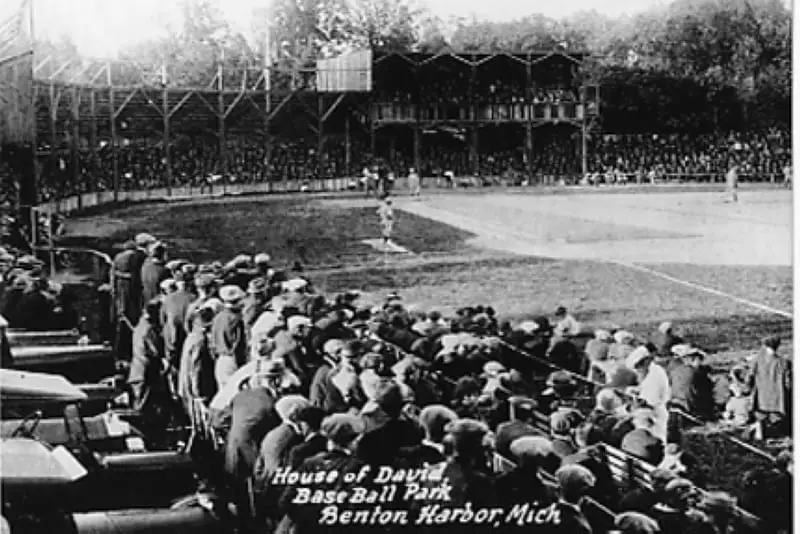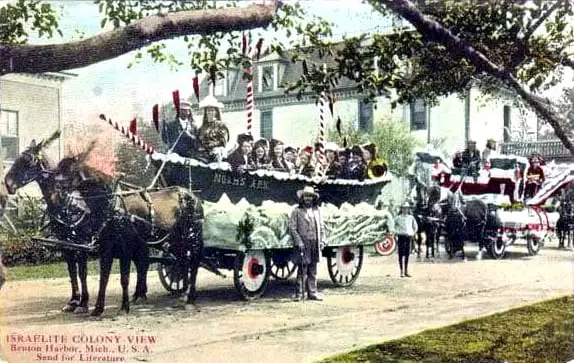
Trainiac/Flickr
Back in the early days of professional baseball, a clean-cut look was required for players. So when the House of David baseball team rolled into town, their long hair and beards flowing as they sprinted across the field, it’s no surprise that they attracted lots of attention.
The story behind this famous barnstorming team begins in Southwest Michigan, where a married couple decided to set down roots and establish a religious colony. When their members formed a team and started playing ball across the country, it began a unique and fascinating journey that would become part of baseball history.
What is the history of the House of David in Benton Harbor?
The House of David is a religious order and commune that was based in Benton Harbor, Michigan. The group focused on reuniting the 12 lost tribes of Israel prior to the Millennium and adhered to a strict and relatively austere lifestyle.
Initially established in the early 1900s, the group became a prominent part of the local community. In addition to owning a significant portion of land in the area, they welcomed outside visitors to local attractions on their property, including an amusement park. The religious order’s baseball team brought national attention to the House of David as they toured on the barnstorming circuit.
Later, the House of David split into two factions after a scandal involving the group’s founder and leader. Member numbers dwindled over the years, but the group’s history continues to fascinate not only those living in the Benton Harbor area, but baseball fans as well.
Who was the founder of the House of David?
The Israelite House of David colony was founded in 1903 by Benjamin Purnell and Mary Purnell, a married couple. The Purnells believed that Benjamin, a native of Kentucky, was a prophet of God — more specifically, the seventh messenger from the Book of Revelations.
After settling in Benton Harbor, Michigan, they formed the House of David as a religious colony. They attracted members from all over the world who believed in the Purnells’ message: the end of days was imminent, but joining the House of David ensured that they’d live forever.
It wasn’t long before the colony had several hundred members. The group had also accumulated around 1,000 acres of land in the Benton Harbor area, which they primarily used for orchard and grain farms. Other features of the colony included a tailor shop, steam laundry, carpenter shop and cannery.
The members of the House of David led a fairly austere lifestyle. They gave up all of their personal possessions, committed to celibacy and swore off meat, drugs, alcohol and tobacco. They even gave up shaving, and members were often identifiable by their long hair and beards.
Despite the members’ self-sufficiency in many areas, they found creative ways to earn money to support the commune. Eden Springs Park, the group’s amusement park, became a regional tourist destination. It featured an amphitheater, miniature train, bowling alley, restaurant and even a beer garden, even though its own members couldn’t partake in the refreshments there.
At first, the House of David wasn’t well-known beyond the Midwest region. However, the formation of colony’s baseball team brought wider recognition to the colony.
What was the House of David baseball team?

FotoGuy 49057/Flickr
The House of David’s founder, Benjamin Purnell, was a serious sports enthusiast. He encouraged the group’s members to play sports as way of developing both physical and spiritual discipline. Baseball was Purnell’s preferred pastime, and in 1913, the House of David baseball team was founded.
The team started out playing locally at their home field in Benton Harbor. By 1920, however, they became a barnstorming team, with their profits going back to support the colony. The House of David baseball team toured all over rural America and even parts of Canada beginning in the 1920s and through the 1950s. They became a national phenomenon, and it wasn’t just the iconic House of David beards that they were known for. The long-haired baseball players displayed their impressive level of skill in exhibition games against amateur, semi-pro and pro teams alike. They competed against some of the sport’s top players in matchups against Minor League, Negro League and Major League Baseball teams.
The House of David baseball team did more than just play traditional games. To show off their skills and agility, they invented the famous pepper game that many still play today. The players were also known for their comedic sleight-of-hand tricks and even occasionally played innings while mounted on donkeys. Their entertaining style of play on the field drew large crowds. Some have even viewed the team as a precursor to the Harlem Globetrotters.
In addition to raising funds for their colony, the House of David players doubled as preachers for the group. They evangelized and helped to recruit new members as they traveled all over the American Midwest and beyond. The promoters set up a full schedule that had them playing as many as three games a day. The team even had a portable lighting system they would bring along on the road to allow for night games to be played.
Why did the House of David baseball team wear beards?
The House of David Michigan baseball team wore long beards and hair in accordance with their religious order’s commands, which prohibited shaving. These features became synonymous with the team, and visiting players who were not members of the colony would sometimes wear false beards to blend in with their teammates.
The name Israelite House of David, combined with the long beards, caused some to mistakenly assume that the players were Jewish. However, the group’s colony did have a guest house where religious Jews from Chicago and Detroit often vacationed. This served as another source of income for the House of David.
The House of David baseball team became so popular that other barnstorming teams started using the name to help boost their profile. Many also wore long beards and hair to resemble the players from the original House of David squad. The most well-known of these groups was the Black House of David, which featured an all African-American team that played against Negro league teams.
Did the House of David have professional players on their baseball team?
The House of David baseball team initially only featured group members on the roster. However, they decided to start hiring professional players beginning in the late 1920s. This helped to grow the program and attract more fans to their baseball games.
Baseball greats like Satchel Paige, Grover Cleveland Alexander and Chief Bender were among the professional baseball players who played for the House of David team, usually on short-term contracts. In accordance with the group’s faith, players from outside the House of David who joined the team were asked to grow out their facial hair. Those who didn’t wish to sometimes wore fake beards instead.
Did Babe Ruth play for the House of David?
Babe Ruth was another pro player who joined the House of David for some games. He wasn’t ever signed as part of the team, but it wasn’t uncommon for professional ballplayers from the MLB to pick up offseason jobs.
Although the group had considered bringing him on officially, they ultimately decided that Ruth’s hard-partying lifestyle of philandering and excessive consumption of alcohol wouldn’t be a good fit for the generally austere ways of the House of David.
Did women play for the House of David baseball team?
Over the course of many years on the barnstorming circuit, the House of David invited a handful of women to join the team. This was often part of a publicity stunt to draw in crowds, but the female ballplayers were still selected due to their undeniable talent and their ability to entertain spectators just as well as their male teammates did.
In 1933, Virne Beatrice “Jackie” Mitchell joined the baseball players with long hair on the House of David baseball team. At just 19 years old, she had already made a name for herself in the sport.
Prior to joining up with the House of David, Mitchell played for the Chattanooga Lookouts, a Double A Southern Association Minor League team. She was added to the Lookouts roster as a publicity stunt to help draw in crowds, but her skills were far more impressive than the team had anticipated. In fact, Mitchel struck out both Babe Ruth and Lou Gehrig in an exhibition game against the New York Yankees on April 1, 1931.
Although the crowd went wild for the pitching sensation, her impressive feat didn’t please some of the big names in baseball. After the game, a Chattanooga newspaper quoted Babe Ruth as saying: “I don’t know what’s going to happen if they begin to let women in baseball. Of course, they will never make good. Why? Because they are too delicate. It would kill them to play ball every day.” In addition, she was dropped by the team when baseball commissioner Kenesaw Mountain Landis voided her contract just days after she struck out Ruth and Gehrig.
The House of David signed Jackie Mitchell two years later, and she went on to become a huge hit while barnstorming with the team. On occasion, she even wore a fake beard to resemble her fellow teammates.
Babe Didrikson also briefly played with the House of David to great success, even though baseball wasn’t her primary sport. Didrikson was an athletic phenomenon who first gained recognition when she competed in the 1932 Olympics, setting four world records and winning medals in three events (80m hurdles, javelin throw and high jump) at a time when there were only six women’s events.
She later went on to form a basketball team named Babe Didrikson’s All-Americans which, coincidentally, included Jackie Mitchell on the roster. Didrikson also participated in Major League Baseball’s spring training in 1934. She became the first woman to play for an MLB team when she pitched for the Oakland Athletics in a spring training game against the Brooklyn Dodgers. She also pitched in games for the St. Louis Cardinals and the New Orleans Pelicans.
After spring training, Didrikson joined up with the House of David. She was reportedly paid $1,500 a month over the course of the summer, but she ultimately decided to pursue golf as a more lucrative career in sports.
What happened to the House of David?

Wystan/Flickr
The House of David amassed quite a bit of wealth in the early 20th century. In addition to profits from the baseball team, amusement park, and guest houses, the group also owned a significant amount of real estate in the Benton Harbor area.
However, a scandal rocked the religious community in the 1920s. Benjamin Purnell was accused by 13 young women of having sexual relations with them while they were still minors. National news ran with the story, and a lengthy trial ensued. Purnell died from tuberculosis in 1927 before the trial concluded. He was ultimately found guilty of fraud, but none of the sex charges resulted in a conviction.
The group became divided and split off into two main factions. One group was led by Benjamin’s wife, Mary Purnell, and became known as Mary’s City of David (the colloquial name for their new title, the New Israelite House of David). The City of David settled on land next to the original commune and continued for decades after Benjamin’s death, although member numbers dwindled over time.
The other faction became the Old House of David, with Judge T. H. Dewhirst placed in the leadership position alongside a council of elders. They remained on the original commune and maintained a small but devoted following for many years.
Today, many view the group as the House of David cult. Many aspects of the group members’ lifestyle, including apocalyptic beliefs, a charismatic leader, and strict lifestyle requirements, align with cultish behaviors as viewed through a modern lens.
A formal history of the religious community can be found at the House of David Baseball and Historical Museum. Run by founder and director Chris Siriano, the museum is located in downtown St. Joseph within just a few miles of much of the property once owned by the religious group. The museum features over 30,000 items, including thousands of photographs, vintage baseball uniforms and even some of Eden Springs’ original amusement park rides.